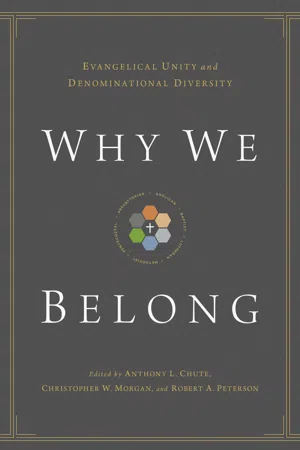![]()
Why I Am an Evangelical and a Pentecostal
Byron D. Klaus
A Pentecostal Childhood
I was born on the prairies of North Dakota and grew up in a small town of fewer than a thousand people. My earliest experiences of religious identity included the perception that my church was different from all the others in town. It was a strong Catholic community, and the seasonal processions from that church through the streets were curious to me indeed. I remember peering in the door of the Catholic Church one day and being amazed at the altar, its images of Jesus on the cross, and so many candles. One day a neighbor kid my age called me a “holy roller,” and I wondered what that meant. When I found out the implication was that we rolled on floors at my church, I was left puzzled, as I had actually never seen such a thing.
Most people attended some church in our town, and it seemed they all had an opinion about the simple little white frame building toward the east end of town where my dad and mom were pastors. I grew up with this sense of being different; we had to have ready explanations for the regular snide remarks we faced. Where I gained an inner strength to deal with this “ubiquitous otherness” that many small-town Pentecostals faced was through songs that described our spiritual journey. We would sing the old Herbert T. Buffum song regularly:
I’m going through, I’m going through,
I’ll pay the price whatever others do,
I’ll take the way with the Lord’s despised few,
but I’m going through, Jesus, I’m going through.
Our identity as outsiders to other traditions in Christianity was implicit, and while my perspective today would certainly have much broader experiences to draw from, that “outsider” label still hovers in the background, regularly calling childhood anecdotal experiences to the surface.
Twentieth-century Pentecostalism included vibrancy among immigrant communities in rural and urban America. My parents co-pastored small German-speaking immigrant congregations while I was growing up. These ethnic enclaves certainly provided reinforcement to the “Lord’s despised few” identity that we all had.
In my elementary school years, we left small-town North Dakota for a large midwestern city. The larger city also gave rise to a new experience for me: disdain from fellow Christians whose beliefs on the basic tenets of historical Christianity were the same as ours. I did not have the word evangelical in my vocabulary at that time, but I remember one day hearing a snide remark on the radio by a Bible teacher making a passing comment about Pentecostals. The descriptive language was graphic and startling to me. He said Pentecostals were the “last vomit of Satan.” Discussion with my parents, who had much more experience in these matters, resulted in a simple but very profound response. They said that some Christians just did not “understand,” and we needed to pray for them to find their personal Pentecost. (I found out years later that this radio speaker was simply quoting the venerable G. Campbell Morgan and his evaluation of early twentieth-century Pentecostalism.)
My growing-up years in a Pentecostal church did not focus on lots of theological treatises that distinguished salient points of historic Christianity, but my theological mind was being formed in very powerful ways. The urgent eschatology that fuels the missionary heart of my denomination (the Assemblies of God) was sung into the fiber of my being. We would sing in German, “O Halleluja der Herr kommt bald,” or in English,
We shall see the King,
we shall see the King,
we shall see the King when he comes,
He’s coming in power,
we’ll hail the blessed hour,
we shall see the King when he comes.
These powerful theological images were reinforced by regular preaching on the Lord’s soon return. Work while it is day for “the night cometh, when no man can work” (John 9:4, KJV) was on the top list of “golden texts” to be memorized because it reinforced the mind-set of our spiritual journey. This urgency about winning the lost was undergirded by the missionaries who regularly visited our church, replete with slide presentations that depicted the urgency of the hour and the “lateness of the times.” Once a month, we would take a missionary offering, and the church missions secretary would read a letter from the “regions beyond.” Sometimes the person reading the letter could not even finish the report without being overcome to the point of tears about the challenges that the missionary was describing.
My commitment to biblical preaching and the authority of Scripture was not rooted in a brilliant apologetic but personified in a simple song my dad had us sing before he preached. I can still hear my dad’s strong voice as he belted out,
The Bible stands, though the hills may tumble;
it will firmly stand when the earth shall crumble;
I will plant my feet on its firm foundation,
for the Bible stands.
My understanding of the authority of Scripture was further shaped by the fact that we actually saw and regularly experienced the power of the gospel. Part of the Pentecostal preaching that shaped my theological mind affirmed that the gospel has power that truly changes people’s lives.
Preaching the Bible called for a response to its authority, and so “altar calls” were not just for salvation but were a place to encounter the God of the Bible who still acted to demonstrate the power of the gospel. To see alcohol or drug dependence broken at our altars was not merely a periodic and emotional experience but a life-transforming event that endured and resulted in restored families and new trajectories in life. We prayed for the sick around those altars, and divine healing was not a doctrine to be defended but a reality to be encountered. I must admit, we expected God to act, and I suppose one could say we were a bit naïve about medical verification of these miracles. All I know is that I grew up having seen people who had been diagnosed with terminal diseases by doctors. After prayer around our altars, they enjoyed full and healthy lives for decades after those medical diagnoses.
That expectant worldview of a God who intervened in the fabric of our lives was also reinforced by the “testimony meeting” where people could stand and give verbal affirmation of distinct ways that God had met their needs in everyday life. The belief that God is a God who acts on my behalf in tangible ways was specifically not described as Pentecostal, but it was clearly viewed as an expression of what we regularly described as the “full gospel.” This description of the gospel could certainly carry with it “inside track” perceptions. We simply saw it as the fact that we were experiencing the fullness of the gospel in tangible ways and very practical dimensions of our lives.
The descriptor “full gospel” also carried with it an implicit belief that the Spirit was poured out at Pentecost on both sons and daughters. I experienced this in my childhood years in a very simple way. My dad and mom were both ordained and served as co-pastors of the three congregations. One never knew who was going to preach Sunday morning or Sunday night or during the midweek services. The only thing that really differentiated my parents and their preaching was that my dad was more proficient at preaching in German than my mom. My mother had been a traveling evangelist before World War II who waited for my dad to return from military service before they were married. I actually did not even know that other Christian traditions had problems with ordained women until I experienced that perspective in seminary. My mom, defending her place as an ordained woman minister, never included any type of angry polemic. She simply said that God had called her; who was she to reject God’s call? She added that there were places she went to preach that men were afraid to go or thought were beneath them. She would say there were people “perishing” simply because men would not go to those places. What was she supposed to do—let people go to hell? So she preached in cattle auction rings, mining camps, and towns that men would bypass as too small. This deep reliance on an encounter with God that inexorably alters the trajectory of our lives has been part of my life from childhood as I viewed its meaning in my dad and mom and their pastoral ministry.
An initial glimpse of my narrative reveals the roots of my faith, which I have critically evaluated over the ensuing years. My theological reflection is much more sophisticated today, but I cannot escape the formative context of my growing-up years. In one sense, my narrative reveals dimensions unique to being Pentecostal, but my guess is that many evangelicals would also resonate with much of my description as their experience as well—though experienced in another family within the spectrum of evangelical Christianity.
Are Pentecostal and Charismatic Interchangeable Terms?
Many people use the descriptors Pentecostal and charismatic interchangeably. While that may be convenient, it confuses the uniqueness of the terms historically. While there are many overlapping dimensions of these two terms, I intentionally describe myself as a Pentecostal, not a charismatic. Pentecostals are linked to global renewal movements that occurred in the late nineteenth and early twentieth centuries. While incipient Pentecostalism viewed organizations with cynicism, within several decades organizational life had begun to appear. Scores of groups emerged during this time around the world. In the United States, groups such as the Assemblies of God; International Church of the Foursquare Gospel; the International Pentecostal Holiness Church; and the Church of God, Cleveland, Tennessee, organized and today would represent the descriptor Pentecostal. The largest of these groups in the United States (also called classical Pentecostals) is the predominately African American Church of God in Christ.
Classical Pentecostalism is informed by five characteristic themes as an integrated structure. These historic themes include justification (God’s forgiveness of sin), sanctification (freedom from the power of sin), divine healing, the second coming of Christ, and t...

